Top Rankings
William Floyd Union Free School District ranks among the top 20% of public school district in New York for:
Category
Attribute
Diversity
Most diverse schools (Top 1%)
Community Size
Largest student body (number of students) (Top 1%)
For the 2025 school year, there are 8 public elementary schools serving 6,089 students in William Floyd Union Free School District. This district's average elementary testing ranking is 3/10, which is in the bottom 50% of public elementary schools in New York.
Public Elementary Schools in William Floyd Union Free School District have an average math proficiency score of 32% (versus the New York public elementary school average of 41%), and reading proficiency score of 36% (versus the 48% statewide average).
Minority enrollment is 72% of the student body (majority Hispanic), which is more than the New York public elementary school average of 61% (majority Hispanic).
Overview
This School District
This State (NY)
# Schools
9 Schools
3,702 Schools
# Students
9,212 Students
1,750,092 Students
# Teachers
706 Teachers
153,310 Teachers
Student : Teacher Ratio
13:1
13:1
District Rank
William Floyd Union Free School District, which is ranked #744 of all 1,015 school districts in New York (based off of combined math and reading proficiency testing data) for the 2021-2022 school year.
The school district's graduation rate of 90% has increased from 75% over five school years.
Overall District Rank
#755 out of 1020 school districts
(Bottom 50%)
(Bottom 50%)
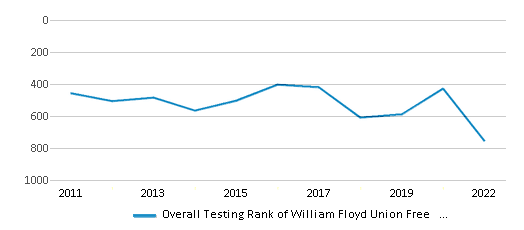
Math Test Scores (% Proficient)
38%
46%
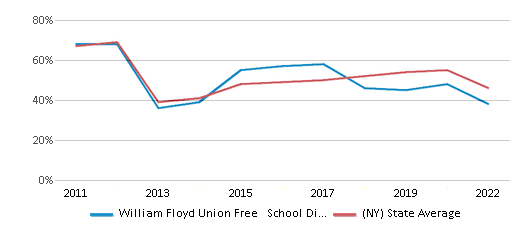
Reading/Language Arts Test Scores (% Proficient)
36%
49%
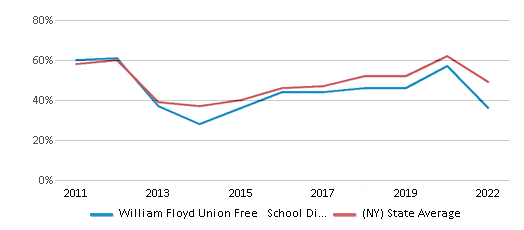
Science Test Scores (% Proficient)
76%
78%
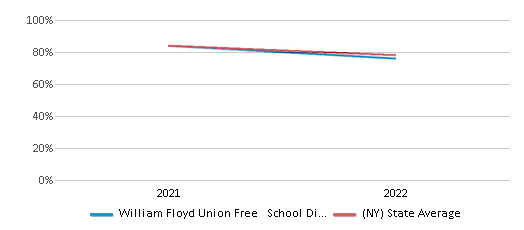
Graduation Rate
90%
87%
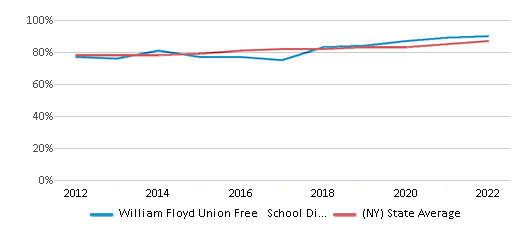
Students by Ethnicity:
Diversity Score
0.67
0.73
# American Indian Students
23 Students
14,013 Students
% American Indian Students
n/a
1%
# Asian Students
220 Students
175,821 Students
% Asian Students
3%
10%
# Hispanic Students
4,365 Students
531,348 Students
% Hispanic Students
47%
30%
# Black Students
1,422 Students
278,768 Students
% Black Students
16%
16%
# White Students
2,681 Students
682,836 Students
% White Students
29%
39%
# Hawaiian Students
21 Students
3,810 Students
% Hawaiian Students
n/a
n/a
# Two or more races Students
480 Students
63,556 Students
% of Two or more races Students
5%
4%
Students by Grade:
# Students in PK Grade:
-
60,112
# Students in K Grade:
647
169,096
# Students in 1st Grade:
623
177,074
# Students in 2nd Grade:
635
181,096
# Students in 3rd Grade:
682
177,104
# Students in 4th Grade:
693
180,516
# Students in 5th Grade:
685
181,163
# Students in 6th Grade:
696
184,038
# Students in 7th Grade:
703
161,270
# Students in 8th Grade:
660
161,773
# Students in 9th Grade:
726
24,993
# Students in 10th Grade:
775
23,859
# Students in 11th Grade:
796
21,596
# Students in 12th Grade:
765
21,027
# Ungraded Students:
126
25,375
District Revenue and Spending
The revenue/student of $27,295 in this school district is less than the state median of $31,307. The school district revenue/student has stayed relatively flat over four school years.
The school district's spending/student of $26,240 is less than the state median of $32,183. The school district spending/student has stayed relatively flat over four school years.
Total Revenue
$251 MM
$78,541 MM
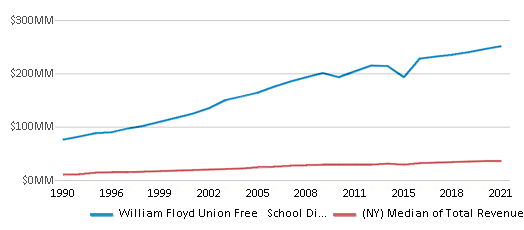
Spending
$242 MM
$80,737 MM
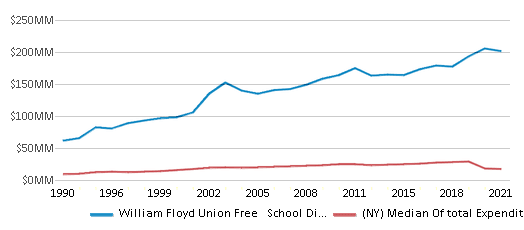
Revenue / Student
$27,295
$31,307
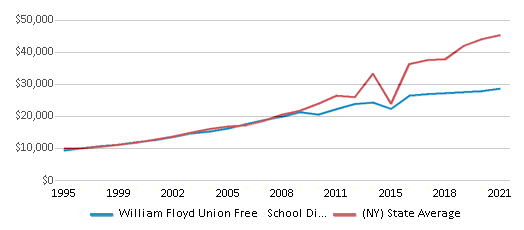
Spending / Student
$26,240
$32,183
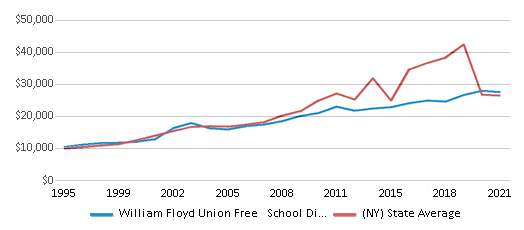
Best William Floyd Union Free School District Public Elementary Schools (2025)
School
(Math and Reading Proficiency)
(Math and Reading Proficiency)
Location
Grades
Students
Rank: #11.
Moriches Elementary School
(Math: 42% | Reading: 37%)
Rank:
Rank:
4/
Bottom 50%10
16 Louis Ave
Moriches, NY 11955
(631) 874-1397
Moriches, NY 11955
(631) 874-1397
Grades: K-5
| 846 students
Rank: #22.
William Floyd Elementary School
(Math: 35% | Reading: 40%)
Rank:
Rank:
4/
Bottom 50%10
111 Lexington Rd
Shirley, NY 11967
(631) 874-1258
Shirley, NY 11967
(631) 874-1258
Grades: K-5
| 744 students
Rank: #33.
Tangier Smith Elementary School
(Math: 38% | Reading: 36%)
Rank:
Rank:
4/
Bottom 50%10
336 Blanco Dr
Mastic Beach, NY 11951
(631) 874-1341
Mastic Beach, NY 11951
(631) 874-1341
Grades: K-5
| 764 students
Rank: #44.
Nathaniel Woodhull Elementary School
(Math: 37% | Reading: 35%)
Rank:
Rank:
4/
Bottom 50%10
6 Francis Landau Pl
Shirley, NY 11967
(631) 874-1301
Shirley, NY 11967
(631) 874-1301
Grades: K-5
| 786 students
Rank: #55.
William Paca Middle School
(Math: 29% | Reading: 38%)
Rank:
Rank:
3/
Bottom 50%10
338 Blanco Dr
Mastic Beach, NY 11951
(631) 874-1414
Mastic Beach, NY 11951
(631) 874-1414
Grades: 6-8
| 987 students
Rank: #66.
William Floyd Middle School
(Math: 26% | Reading: 41%)
Rank:
Rank:
3/
Bottom 50%10
630 Moriches-mid Isl Rd
Moriches, NY 11955
(631) 874-5505
Moriches, NY 11955
(631) 874-5505
Grades: 6-8
| 1,107 students
Rank: #77.
John S Hobart Elementary School
(Math: 32% | Reading: 23%)
Rank:
Rank:
2/
Bottom 50%10
230 Van Buren St
Shirley, NY 11967
(631) 874-1295
Shirley, NY 11967
(631) 874-1295
Grades: K-5
| 784 students
Rank: #88.
William Floyd Learning Center
Special Education School
(Math: ≤10% | Reading: ≤10%)
Rank:
Rank:
1/
Bottom 50%10
111 Lexington Rd
Shirley, NY 11967
(631) 874-1607
Shirley, NY 11967
(631) 874-1607
Grades: K-5
| 71 students
Recent Articles

Year-Round Or Traditional Schedule?
Which is more appropriate for your child? A year-round attendance schedule or traditional schedule? We look at the pros and cons.

Why You Should Encourage Your Child to Join a Sports Team
Participating in team sports has a great many benefits for children, there is no doubt. In this article you will learn what those benefits are.

White Students are Now the Minority in U.S. Public Schools
Increasing birth rates among immigrant families from Asia and Central and South America, combined with lower birth rates among white families, means that for the first time in history, public school students in the United States are majority-minority. This shift in demographics poses difficulties for schools as they work to accommodate children of varying language abilities and socio-economic backgrounds.





